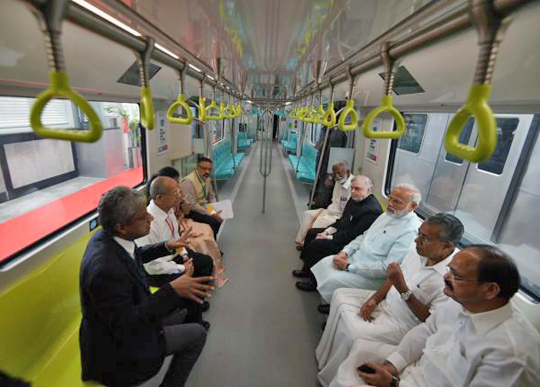Thiruvananthapuram, Jun 17: Kerala shifted tracks to a new phase in urban transport infrastructure on Saturday, with Prime Minister Narendra Modi dedicating the first phase of Kochi Metro to the nation.

Before the formal opening of the 13.26-km first phase, between Palarivattom and Aluva, the Prime Minister took a ride on one of the trains. Addressing a gathering at the inaugural event’s venue in Kaloor, Modi highlighted features of Kerala’s first metro rail network which made it unique.
Kochi Metro is the first metro project commissioned with Communication-Based Train Controlling Signalling System. The Kochi Metro Rail Limited (KMRL) has provided jobs for about 1,000 women and 23 trans-genders. “The project is also an example of environment-friendly development. It plans to meet nearly 25% of the entire energy requirements from renewable sources, particularly solar energy. The long-term plan is to become a zero-carbon emitting urban transit system,” the Prime Minister said.
Modi said 50 cities in the country were ready to implement metro rail projects and foreign investment had been invited to the urban public transport sector. He said the National Transit Oriented Development Policy, issued in April, aimed to create “compact walkable communities” and bring public transport closer to transit.
Chief Minister Pinarayi Vijayan acknowledged contributions of migrant labourers in the construction of the Metro and requested KMRL to facilitate a Metro ride for them. Lauding the project coordinators for finishing work on the Metro on schedule, the Chief Minister said Kochi Metro sent out a message to potential investors that development projects could be completed in a time-bound manner in Kerala.
He sought assistance from the Centre to further the state-Centre association to pursue the development agenda while acknowledging the Centre’s “positive” approach to development. In a veiled reference to earlier uncertainties over the Prime Minister’s presence at the event, Vijayan said people who created the controversy were left “disappointed”. Kochi Metro will begin commercial operations on Monday.
Insets
On track
** Construction completed in four years
** Total project cost of Rs 5,181.79 crore
** Rs 2032.91 crore released by GoI
** Total 25.612 km, fully elevated, from Aluva to Petta
** 22 stations; 11 in phase 1
** 13.26 km in phase 1, in 20 minutes
** A train every 10 minutes, fares start at Rs 10
** First-in-India open-loop smart card for buses, taxi-cabs, autos
** 25% of energy requirements from renewable sources
** Covered vertical garden on every sixth pillar
** Water Metro as feeder service planned with 38 jetties
Cheers to Metro man
At the inaugural event attended by senior politicians and bureaucrats, the loudest cheers from the 3,000-odd crowd were reserved for ‘Metro Man’ and Chief Adviser for Kochi Metro, E Sreedharan. The applause, every time his name was mentioned on the dais, was significant after an earlier controversy over his exclusion from the dais. The veteran engineer, however, was characteristically self-effacing in his response. “(the cheers were) Probably because I’m a local,” he told reporters.
Fracas over a "free ride"
The presence of BJP state president Kummanam Rajasekharan during the Prime Minister’s inaugural Metro journey has come in for some criticism. Rajasekharan was not in the original list of passengers scheduled to travel with Modi, from Palarivattom to Pathadippalam.
The PM was accompanied by Governor P Sathasivam, Union Urban Development Minister Venkaiah Naidu, Pinarayi Vijayan, Chief Secretary Nalini Netto, Urban Development Secretary Rajiv Gauba, E Sreedharan and KMRL Managing Director Elias George. Rajasekharan’s presence was criticised on social media, also because elected representatives were not invited for the ride.





Comments
BJP is trying really hard to make a mark in Kerala. They are using all the PR tricks known to them.
Add new comment